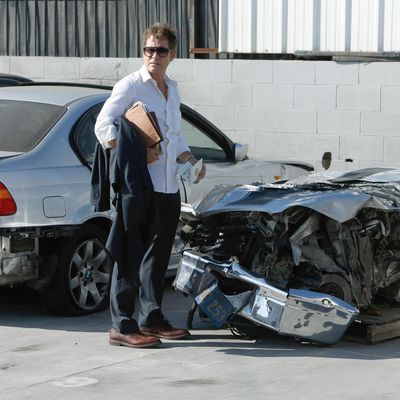
Let’s start by giving Greg Kinnear credit for being Greg Kinnear. He’s got that Tom Hanks, Robert Downey Jr. sort of charisma, where you watch him play rude, arrogant, even destructive people and still think, There’s good in this man, and did you see that twinkle in his eye? He radiates empathy and hopefulness, even when he’s playing men as scummy as Rake’s lead character Keegan Deane, a gambling-addicted, womanizing, perpetually hung-over attorney.
This show pushes Kinnear’s likability to the limit. Tonight’s episode kicks off with Keegan getting slammed into a men’s room wall by a legbreaker for one of his creditors, a bookie; then it follows Keegan through a montage of debauchery. He carouses with a woman he picked up at the bar where the legbreaker attacked him, drinks and dances with her, gets pulled into an all-night poker game, then takes the woman home for an early morning lay. By “home,” I mean the home of his best friends, a married couple named Ben (John Ortiz) and Scarlett (Nekar Zadegan), a prosecutor whom Keegan often faces in court. Keegan has a prostitute girlfriend named Mikki (Bojana Novakovic), whom he takes for granted, and a loyal assistant named Leanne (Tara Summers of Boston Legal), whom he works and works but rarely pays because his practice is teetering on the edge of bankruptcy.
Then, much to his surprise, Keegan stumbles into a potentially big case, defending an accused serial killer (Peter Stormare). The man pled guilty to nine murders but claims he only committed one. He says he’s being railroaded by a former police department bigwig and wannabe-mayor who coerced the confessions to write off unsolved murder cases. In most stories about sleazy lawyers, the client would be very clearly innocent, and the lawyer would treat the case as a chance to rediscover his idealism and redeem himself. Keegan, though, seems as if he never had any idealism to lose. He’s mainly annoyed at being expected to spend months or years defending a guy who can’t pay him. It’s only when the prospect of a lucrative class-action suit against the LAPD presents itself that he starts to give half a damn, and even then it’s only because he has debts.
This show is being likened to one of Fox’s biggest recent hits, House, but the comparison doesn’t fit because whatever his flaws as a man, House was great at his job. Even though he lacked any semblance of a decent bedside manner, he was a passionate scientist; when it came to the nuts and bolts of deducing why his patients were suffering and doing something about it, he could display Sherlock Holmes–level insight, as long as he wasn’t letting addiction or personal animus cloud his judgment. Keegan isn’t a terrible attorney, from what we can see. Nevertheless, because the hero seems to view the lawyering thing as a means to an end — or more often a dull chore — it’s hard to become invested in his latest case. Since no network would build a drama around an incompetent lawyer who doesn’t care about his job and never will, you know Keegan will eventually slough off his exasperated attitude and become at least somewhat more engaged, but this potentiality is a rather slim reed on which to hang a drama that Fox would like to build into a long-running hit.
Rake is adapted from a same-titled Australian series created by Peter Duncan. Its main character is based on a real attorney, Sydney barrister and author Charles Waterstreet. I’ve watched bits and pieces of it; it doesn’t seem particularly deep, but it’s got a distinctively cynical vibe that this American version either can’t or won’t replicate, and for whatever reason (the tone, the accents, the unfamiliarity of the setting?), the main character’s reflexive scumbaggery plays better. One of the American Rake’s executive producers is Peter Tolan, who’s no stranger to the “funny bastard” school of TV dramaturgy. He worked on the Denis Leary vehicles The Job and Rescue Me, among other shows. So I wouldn’t rule out the possibility that Rake could evolve into a sterling example of that kind of series. The question, though, is whether anybody wants to see another program like that. We’re deep into TV’s antihero era; post–Don Draper, you’ve got to bring something to the table besides “Look at this screwed-up, selfish jerk — isn’t he fascinating?” Rake seems to believe he’s fascinating, but the evidence does not persuade.


